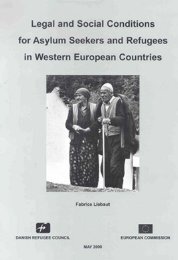Bulgaria - The social impact of seasonal migration
Bulgaria - The social impact of seasonal migration
Bulgaria - The social impact of seasonal migration
Create successful ePaper yourself
Turn your PDF publications into a flip-book with our unique Google optimized e-Paper software.
Population movement in Kirkovo municipality for the period 1989-2003 (population<br />
statistics data):<br />
Table 24<br />
Year Residents with permanent address Residents with actual address<br />
1989 46 198 44 620<br />
1991 46 426 40 000<br />
1992 46 597 34 812<br />
1993 46 729 33 808<br />
1994 46 814 32 007<br />
1995 46 747 30 226<br />
1996 46 680 28 974<br />
1997 46 465 28 079<br />
1998 46 121 26 929<br />
1999 45 914 26 046<br />
2000 45 595 26 031<br />
2001 45 514 25 904<br />
2002 45 381 24 902<br />
2003 45 354 24 676<br />
Apart from its deep demographic and economic consequences, depopulation has a<br />
political dimension too. E<strong>migration</strong> has been quoted as one <strong>of</strong> the reasons behind the<br />
<strong>Bulgaria</strong>n ethnic experience, cited as the most successful model <strong>of</strong> integration <strong>of</strong><br />
ethnically diverse populations on the Balkans (Ilchev 2000, 259). As a result <strong>of</strong> the<br />
decline in the population <strong>of</strong> Kurdzhali region, two parliamentary seats were removed<br />
from it, which intensified political struggle there but diminished the region's political<br />
weight.<br />
Resolved to deal with depopulation, the <strong>Bulgaria</strong>n government attempted to settle<br />
ethnic <strong>Bulgaria</strong>ns coming from abroad into such regions. Ethnic <strong>Bulgaria</strong>ns from<br />
Moldova and the Ukraine returning to <strong>Bulgaria</strong> were settled around the town <strong>of</strong><br />
Kurdzhali. In addition to their brining human resources to deserted areas, their<br />
settlement there increased the number <strong>of</strong> ethnic <strong>Bulgaria</strong>ns in this politically sensitive<br />
region. This unwritten policy did not go without problems. <strong>The</strong> desire <strong>of</strong> returning<br />
ethnic <strong>Bulgaria</strong>ns was to settle in the cities and towns, while the State Agency for<br />
<strong>Bulgaria</strong>ns Abroad tried to direct them to the deserted areas, to compensate for the<br />
insufficient work force and to help improve the situation <strong>of</strong> the declining agriculture.<br />
<strong>The</strong> greatest challenge was to manage to attract young ethnic <strong>Bulgaria</strong>ns, some <strong>of</strong> them<br />
enrolled in universities through a special governmental programme, to these<br />
depopulated lands (interview No. 2).<br />
Another negative <strong>impact</strong> <strong>of</strong> <strong>migration</strong> is related to irregular migrants and more<br />
concretely to the growing number <strong>of</strong> deported <strong>Bulgaria</strong>ns, whose expulsion attracts<br />
public attention and contributes towards the formation <strong>of</strong> a negative image <strong>of</strong> <strong>Bulgaria</strong><br />
in some EU countries. “<strong>The</strong> problem <strong>of</strong> illegal im<strong>migration</strong> in the Netherlands has several<br />
aspects. First, it creates a very bad image <strong>of</strong> <strong>Bulgaria</strong>ns here – usually “a <strong>Bulgaria</strong>n” is<br />
associated with a prostitute, Roma beggar or a thief, despite the fact that most <strong>of</strong> the<br />
illegally working people here are working in the hot houses. From the point <strong>of</strong> view <strong>of</strong> our<br />
future integration in the EU, the country’s bad image is a great problem, so I am trying to<br />
53

















